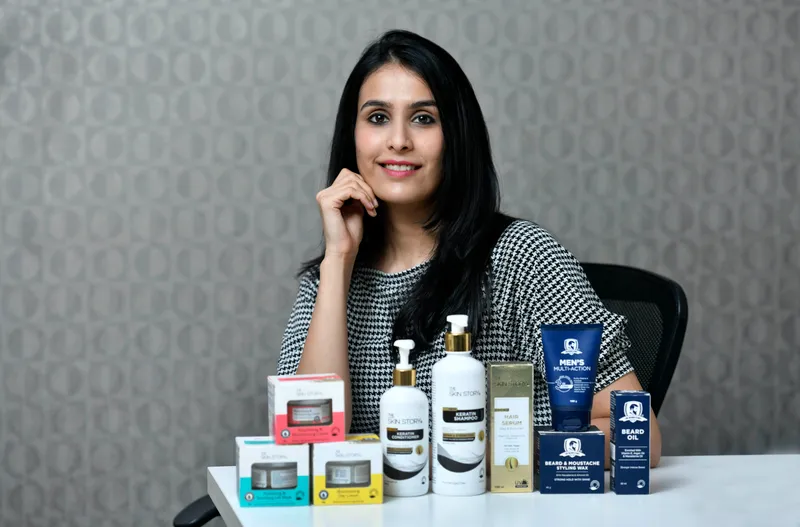How this woman entrepreneur’s retail-first vegan skincare brand survived the pandemic
Founded by Ravina Jain, Mumbai-based vegan skincare brand The Skin Story offers a range of affordable products and is tapping the offline and online markets.
India’s skincare market appears to be the pie that everybody – from the homemaker with little initial investment to well-funded startups and global brands – wants a slice of.
According to MarketResearch, India's skincare market was valued at Rs 129.76 billion in 2020 and is expected to reach Rs 191.09 billion by 2025, increasing at compound annual growth rate (CAGR) of 8.22 percent between 2021 and 2025. So what would be the best way to enter the crowded market?

Ravina Jain, Founder & CEO, The Skin Story with the product range
Entrepreneur Ravina Jain spotted one gap to make her way into the skincare space.
"Most products are not very effective and the few clinically-researched products that help solve specific problems like pigmentation or acne are usually very expensive,” she tells HerStory.
In 2019, Ravina decided to start The Skin Story with a range of vegan, affordable, FDA-approved skincare products.
The journey
The Skin Story is not Ravina’s first brush with entrepreneurship. After completing a bachelor’s course in commerce from Jadavpur University in Kolkata, she pursued MBA in marketing from Management Development Institute of Singapore (MDIS).
In 2015, she co-founded Streethopper, a fashion accessories brand that became profitable in its third month of operation. After her marriage, she went on to start a wellness and nutrition brand BodyFirst, along with her husband Pranay Jain in 2018. Ravina has left the ventures, and both brands are now run by her co-founders.
With a keen interest in the skincare sector, Ravina decided to start her own D2C brand and a sister brand, The Beard Story, for men’s grooming products.
“Men are becoming more and more conscious about buying personal grooming products and the demand is increasing. The Beard Story gives us an upper edge as a brand that makes products exclusively for men," Ravina says.
With about 45 SKUs for The Skin Story at the moment, Ravina says her company offers a range of cleansing products like shampoo and face wash for daily use. These are formulated by the in-house R&D team and priced between Rs 149 to Rs 225.
The Skin Story also offers an expert care range with result-oriented products such as pimple and acne corrector gel, under eye gel for dark circles and puffy eyes, anti-ageing serum, blue light protection face mist, among others, from a starting price of Rs 649.
The products are now available both offline and online on its website and marketplaces like Amazon, Nykaa, Cred, Pharmeasy, and NedMeds in addition to its own website. The Skin Story was initially started offline and has a presence in about 2,000 stores across Punjab, Gujarat, Maharashtra, West Bengal, Goa, Delhi, Noida, and Uttarakhand (offline market contributes to 75 percent of its sales).
The brand is also available in Dubai and Nepal, and is now looking to list on Amazon US.
COVID-19 and other challenges
COVID-19 posed a major challenge for a skincare brand that relied heavily on the traditional retail strategy for growth, and Ravina made sure to quickly tap the ecommerce space.
The skincare startup claims to have fulfilled more than five lakh orders so far.
During the peak pandemic year (2020-21), it clocked Rs 1.2 crore in revenue, which went up to Rs 4 crore in 2021-22. The entrepreneur says revenue is continuing to pick up at a good pace. The Skin Story’s total revenue in April and May was Rs 55 lakh and Rs 70 lakh, respectively.
Ravina says brand building – be it through the retail market or an online D2C strategy – comes with specific sets of challenges. While the last two years have been full of learning and the entrepreneur hopes to continue growing her brand’s online presence, she maintains that offline retail is the space to be.
The founder is now focused on battling the increase in raw material cost due to the ongoing Russia-Ukraine war. Importing raw materials like butter, creams, essential oils, and other ingredients from France, Italy, the US, Indonesia, Switzerland, Japan and sourcing packaging solutions from China continues to be a challenge, Ravina says.
Edited by Teja Lele








